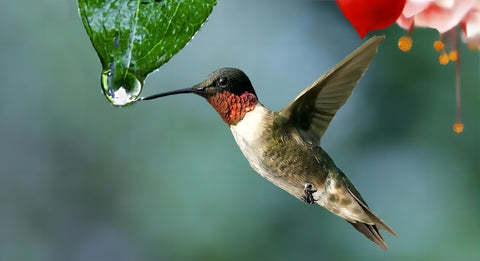Hummingbird: The smallest bird in the world, with brightly colored, scaly feathers
Hummingbirds are small birds. They are usually very small, but they have very powerful flight abilities. Hummingbirds' wings can vibrate at a rate of 80 times per second, allowing them to hover in the air, backtrack, fly and turn.Hummingbirds can fly at speeds of up to 60 miles per hour, making them among the fastest birds in the world.
Hummingbird feathers are usually brightly colored and shiny. Their wings can vibrate rapidly, making a buzzing sound, due to their wing structure and vibration frequency.
Hummingbirds have a body structure perfectly suited for flight. Their wings are very long and narrow, which generate high velocity air currents, allowing them to hover in the air. Hummingbirds also have very special mouths, which are very long and thin and can pass through small holes in flowers to draw nectar from them. Hummingbirds also have very long tongues that they can stick out to suck nectar from flowers. And in the process of sucking honey, it also helps the flowers pollinate. In addition to nectar, hummingbirds also eat the insects, spiders, and pollen in the nectar.
Hummingbirds feed mainly on nectar and insects. They are voracious eaters, eating more than twice their body weight every day. Hummingbirds have a very fast digestive system and can digest food in a few minutes.Hummingbirds also reproduce in a very special way. Male hummingbirds display their beautiful feathers and flying skills in the air to attract the attention of female hummingbirds. If the female hummingbird is interested in the male, they will fly together to a safe place to mate.

Hummingbirds live mainly in the tropical regions of South and Central America. They usually live in mountains and forests, but they can also be found in cities and towns. The number of hummingbirds is decreasing, mainly due to human activities and environmental damage.
Hummingbirds are very special birds. They have great flight ability and unique body structure. We should protect their living environment and let them continue to multiply and live on the earth.
Contact: brenda@pethuhou.com